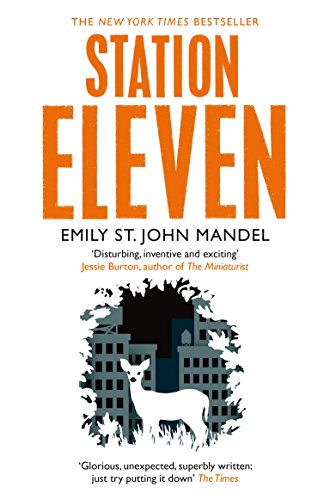...the difference was that they’d seen electricity, they’d seen everything, they’d watched a civilization collapse, and Shakespeare hadn’t. In Shakespeare’s time the wonders of technology were still ahead, not behind them, and far less had been lost. [loc. 288]
The premise of Station Eleven is simple, and horribly timely: a deadly and fast-acting strain of flu wipes out most of human civilisation. It's the novels's structure that makes it more than a narrative of disaster.
The opening scene focuses on the death of an actor: Arthur Leander, playing Lear, who collapses on stage and dies of a heart attack. This has nothing to do with the virus, but Arthur is the link connecting the protagonists of the story that follows. The paramedic Jeevan will, later that evening, be warned of the 'Georgian flu' and self-isolate with his brother, the child actress Kirsten will become an itinerant player after the contagion has done its worst, his first wife Miranda has written the comic that gives the novel its name.
After Arthur's death the novel meanders, alternating scenes from before the flu with the more structured narrative of a group of travelling players (the Travelling Symphony) in Year Twenty. We see the disintegration of Arthur and Miranda's marriage, and the depradations of the Prophet, whose army of zealots occupy towns and kidnap 'wives' for their leader. We see Shakespeare performed to people who don't remember life before the flu, and stranded travellers negotiating for supplies. And we see the Museum of Civilisation, founded by Arthur's old friend Clark in the Skymiles Lounge at a small regional airport.
The scenes set before the pandemic sometimes feel as though they belong in a mainstream literary novel, the kind in which the events are psychological rather than objectively real: but Mandel adds the occasional observation to remind us that this state of affairs is fragile and temporary. ("Of all of them there at the bar that night, the bartender was the one who survived the longest" ... "these were things that [she] remembered in the last few hours, two weeks later" ... "He removed his Amex card from his wallet with a flourish and left it next to the cash register, where it remained untouched for the next ninety-seven days.")
The novel doesn't simply focus on the pre- and post-cataclysm lives of the characters, but slowly and subtly shows the multiple connections between each of them. Jeevan was a paparazzi before he was a paramedic, and photographed Miranda; Miranda depicts her dog, Luli, in the 'Station Eleven' comic, and Kirsten meets a man whose dog is named Luli ...
I read this as the Covid-19 pandemic began to bite: I found it positive and uplifting, possibly because the flu depicted in the novel is quite different to (and considerably more lethal than) our current coronavirus. It's a thoughtful, considered novel, and I feel it's more about the importance of art, and of personal connection, than it is about the pandemic. And I loved the way that the 'Station Eleven' comic (a big-screen space opera in which aliens have invaded the earth and Doctor Eleven has manoeuvred his stolen space station, home to a few hundred survivors, through a wormhole into deep space) provides allegory, connection and resolution. Art matters at times of crisis. Art matters.

No comments:
Post a Comment